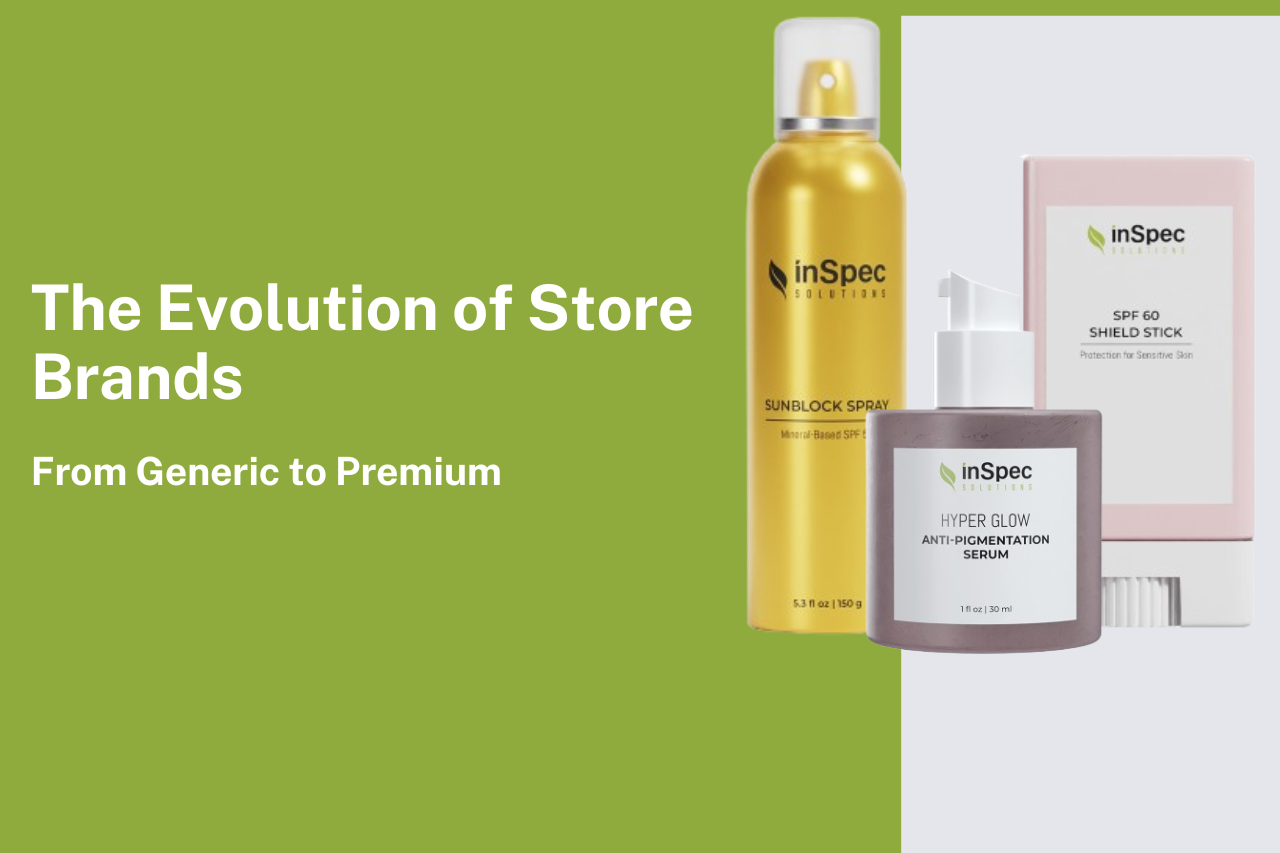In the dynamic world of retail, few transformations have been as impactful as the evolution of store brands. Once considered mere budget alternatives, these private label products have undergone a remarkable metamorphosis, emerging as formidable competitors to national brands and, in many cases, as premium offerings in their own right. As a leading contract manufacturer, InSpec Solutions has been at the forefront of this revolution, partnering with retailers to create innovative, high-quality store brand products.
The Humble Beginnings
Store brands, also known as private labels or own brands, have been part of the retail ecosystem for over a century. In the 1970s and 1980s, they were synonymous with generic products, often packaged in stark white boxes with simple black lettering. The message was clear: sacrifice brand recognition for a lower price point.
The Turning Point
The perception of store brands began to shift in the 1990s and early 2000s. Several factors contributed to this change:
- Improved Quality: Retailers invested in enhancing the quality of their private label products, partnering with experienced contract manufacturers like InSpec Solutions to narrow the gap with national brands.
- Economic Pressures: The 2008 financial crisis pushed more consumers towards value-oriented options, giving store brands a chance to prove their worth.
- Changing Consumer Attitudes: Millennials, in particular, showed less brand loyalty and more willingness to try store brands.
- Retail Consolidation: Larger retail chains had more resources to invest in developing and marketing their own brands.
The Rise of Premium Private Labels
Today, many store brands have transcended their generic roots to become premium offerings. This evolution is characterized by:
- Tiered Offerings: Many retailers now offer good-better-best private label options, with premium tiers competing directly with high-end national brands.
- Innovative Products: Store brands are often first to market with innovative products, leveraging their close relationship with contract manufacturers and consumers.
- Sleek Packaging: Gone are the days of plain white boxes. Today’s store brands feature sophisticated packaging design that rivals or exceeds that of national brands.
- Expanded Categories: Private labels have expanded beyond basic groceries into categories like beauty, wellness, and even electronics.
- Emphasis on Transparency: Many store brands highlight their products’ origins, ingredients, and manufacturing processes, appealing to conscious consumers.
Case Studies
Trader Joe’s
Trader Joe’s has built its entire business model around private label products. By offering unique, high-quality items under its own brand, it has cultivated a devoted following and positioned itself as a destination retailer.
Target’s Good & Gather
Launched in 2019, Good & Gather has quickly become a billion-dollar brand. It offers premium food and beverage products with a focus on quality ingredients and taste, demonstrating how a well-executed store brand can drive significant revenue.
Costco’s Kirkland Signature
Kirkland Signature products often outperform national brands in both quality and sales. The brand’s success has been so significant that it’s become a key driver of Costco memberships.
The Future of Store Brands
As we look to the future, several trends are likely to shape the continued evolution of store brands:
- Sustainability Focus: Expect to see more store brands emphasizing eco-friendly packaging and ethically sourced ingredients.
- Personalization: Leveraging customer data, retailers may offer more personalized private label products.
- Direct-to-Consumer: Some successful store brands may expand beyond their parent retailers, selling directly to consumers online.
- Collaborations: We may see more collaborations between store brands and celebrities, chefs, or influencers to create limited-edition products.
The Role of Contract Manufacturers
As store brands continue to evolve and premiumize, the role of experienced contract manufacturers becomes increasingly crucial. At InSpec Solutions, we’ve been instrumental in helping retailers elevate their private label offerings:
- Quality Assurance: Our state-of-the-art facilities and rigorous quality control processes ensure that store brand products meet or exceed the standards of national brands.
- Innovation Partnership: We work closely with retailers to develop unique formulations and cutting-edge products that set their store brands apart.
- Scalability: Our production capabilities allow retailers to scale their private label offerings efficiently, from initial concept to mass production.
- Regulatory Compliance: We navigate complex regulatory landscapes, ensuring that all products meet necessary standards and certifications.
Conclusion
The journey of store brands from generic alternatives to premium offerings is a testament to the power of strategic brand management and innovative manufacturing partnerships. As these brands continue to evolve, they’re not just competing with national brands—they’re redefining the very nature of branding in retail.
For retailers looking to develop or enhance their private label offerings, partnering with an experienced contract manufacturer is key. InSpec Solutions brings decades of expertise in creating high-quality, innovative products that can help your store brand stand out in an increasingly competitive market.
Ready to elevate your store brand? Contact InSpec Solutions today to explore how we can help you create premium private label products that resonate with today’s discerning consumers.




